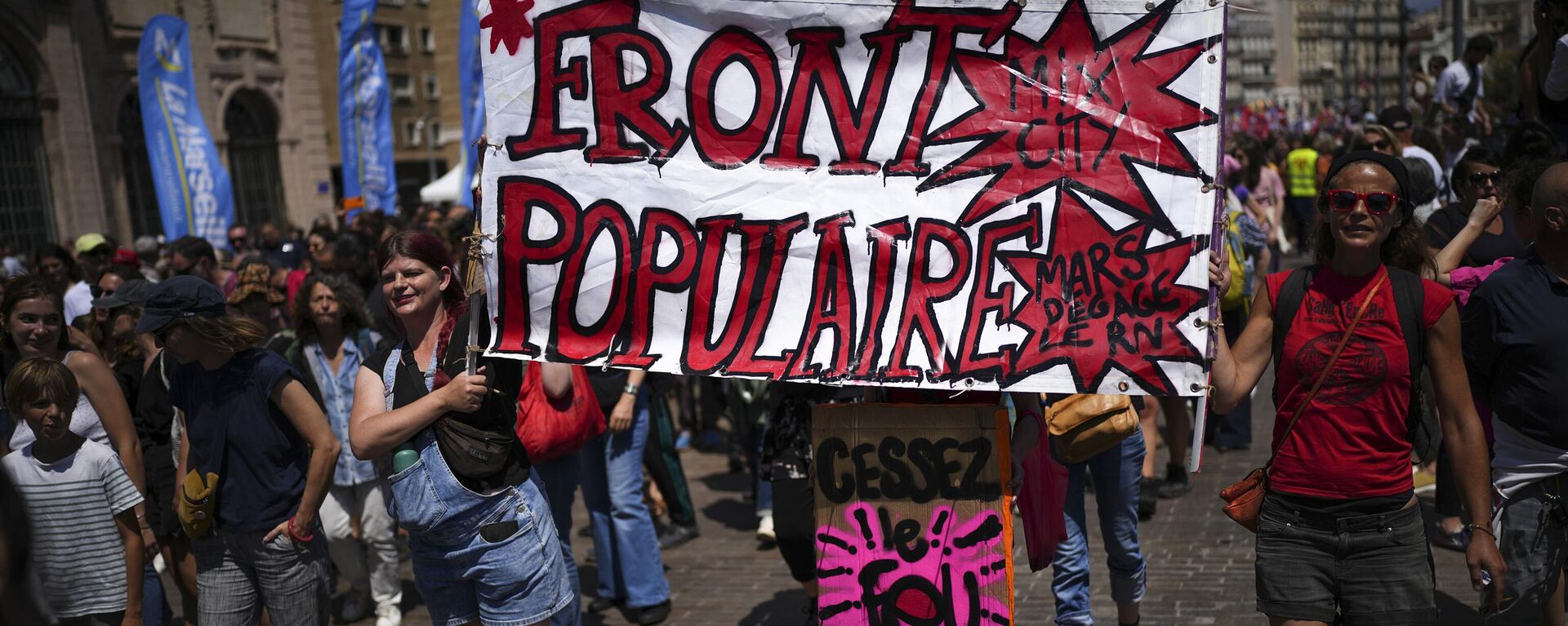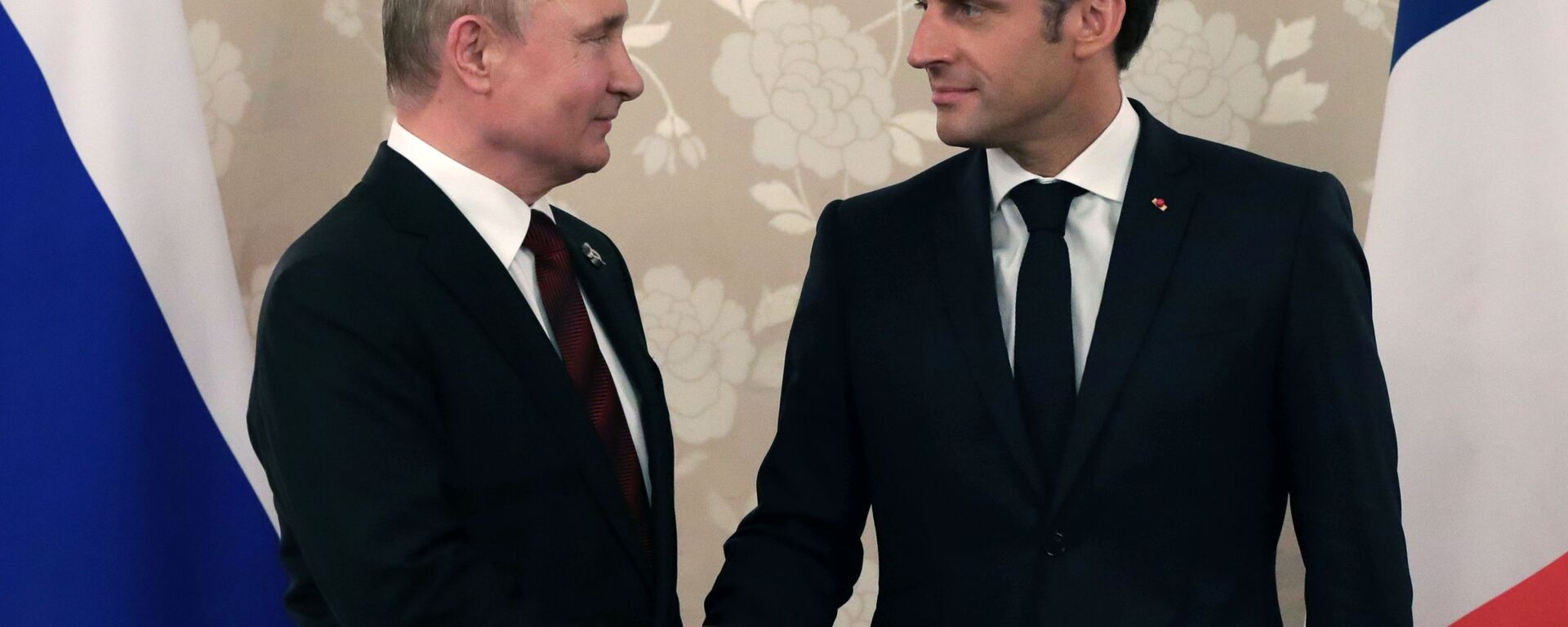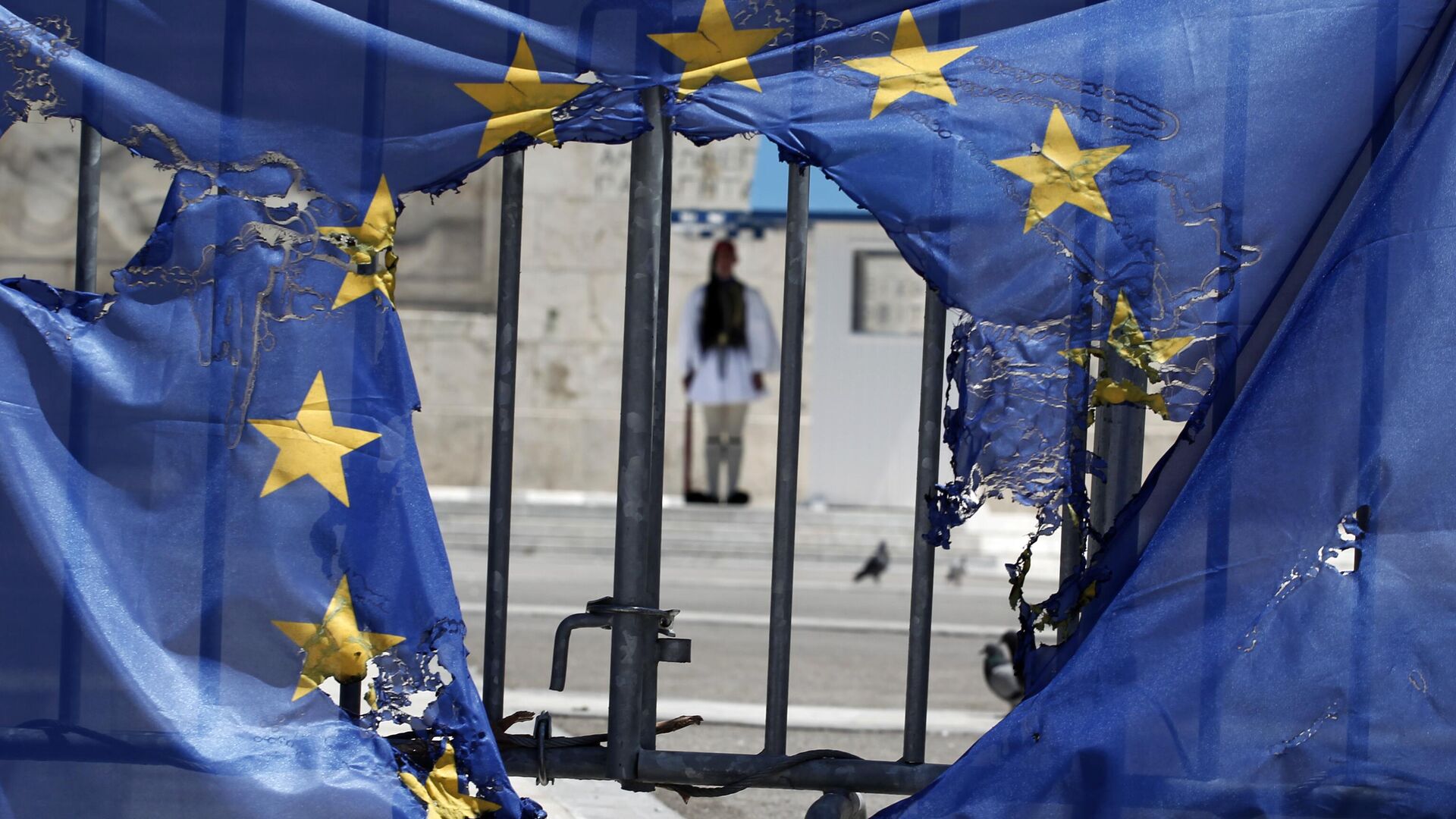https://sputnikglobe.com/20241015/as-facade-of-liberal-democracy-crumbles-political-tensions-put-eu-at-risk-1120552189.html
As Facade of Liberal Democracy Crumbles, Political Tensions Put EU at Risk
As Facade of Liberal Democracy Crumbles, Political Tensions Put EU at Risk
Sputnik International
The EU, the fragile assemblage of former colonial powers tasked with enforcing neoliberal economics under the guise of maintaining peace in Europe, appears brittle as ever as leaders in France and Germany are increasingly at odds.
2024-10-15T01:09+0000
2024-10-15T01:09+0000
2024-10-15T01:09+0000
analysis
europe
emmanuel macron
france
germany
european union (eu)
financial times
new popular front (nouveau front populaire)
jeremy corbyn
vladimir lenin
https://cdn1.img.sputnikglobe.com/img/07e8/02/0f/1116792375_0:160:3072:1888_1920x0_80_0_0_5adf8600a8dbf2d82997688574f8db15.jpg
The EU, the fragile assemblage of former colonial powers tasked with enforcing neoliberal economics under the guise of maintaining peace in Europe, appears brittle as ever as leaders in France and Germany are increasingly at odds.France finds itself in its precarious position after seven years of governance under President Emmanuel Macron, a former investment banker for the multinational firm Rothschild & Co. With a slick presentation drawing comparisons to former US President Barack Obama, Macron has imposed strict fiscal discipline – on the middle class, naturally – raising the country’s retirement age, reversing hard-won labor rights and slashing social spending.The results have been grim politically and economically, but neoliberalism is a fully non-falsifiable doctrine, its failure only prompting the imposition of more neoliberalism.Meanwhile Berlin – traditionally the de-facto ruling power of the European Union – is less credible than ever as it is announced the German economy will contract for the second straight year. The country once played a leading role in imposing poverty on Greece, Ireland, and other “periphery” nations, but its luck has run out as subservience to US-backed sanctions on Russian energy have cratered its industrial base.New political actors have come to the fore amid Europe’s economic implosion, facing repression from establishment forces. In the UK, Jeremy Corbyn’s insurgent campaign was derailed by a manufactured antisemitism crisis. In Germany there is talk of banning the right-wing Alternative für Deutschland party, which has won favor criticizing the country’s foreign policy.In France, leaders opted to simply ignore inconvenient election results as Macron bypassed the victorious New Popular Front coalition to choose a prime minister from a party winning less than 6% of the popular vote.As nationalist tensions threaten to pull Europe apart, leaders increasingly agree only on funding for Ukraine as the country continues its quixotic proxy war on behalf of the Western Russophobic elite. Twentieth century social democracy appears a distant dream as economic elites seize control of the state, increasingly signaling aggression against the threat posed by China and Russia’s growing multipolarity movement.Russian revolutionary Vladimir Lenin anticipated such trends in 1915, seeing that the search for profit would pit each country’s ruling class against the rest of the world – and eventually against each other.
https://sputnikglobe.com/20241011/frances-military-budget-to-increase-to-55bln-in-2025-1120510041.html
https://sputnikglobe.com/20240907/thousands-protest-across-france-against-barniers-appointment-as-prime-minister---reports-1120070232.html
https://sputnikglobe.com/20240908/france-should-seek-brics-membership-to-return-to-multipolar-policy---ex-eu-mp-1120075332.html
france
germany
Sputnik International
feedback@sputniknews.com
+74956456601
MIA „Rossiya Segodnya“
2024
John Miles
https://cdn1.img.sputnikglobe.com/img/07e8/01/19/1116388787_0:0:1316:1316_100x100_80_0_0_77e70d36afd983012b1c5d38ddb84156.jpg
John Miles
https://cdn1.img.sputnikglobe.com/img/07e8/01/19/1116388787_0:0:1316:1316_100x100_80_0_0_77e70d36afd983012b1c5d38ddb84156.jpg
News
en_EN
Sputnik International
feedback@sputniknews.com
+74956456601
MIA „Rossiya Segodnya“
Sputnik International
feedback@sputniknews.com
+74956456601
MIA „Rossiya Segodnya“
John Miles
https://cdn1.img.sputnikglobe.com/img/07e8/01/19/1116388787_0:0:1316:1316_100x100_80_0_0_77e70d36afd983012b1c5d38ddb84156.jpg
france germany tensions, france budget deficit, eu economy failing, european union tensions, european union breakup, european union democracy, european union impossible, lenin european union, multipolar world order, multipolarity, unipolar world order, economic crisis, german economy, failing economy, economic decline
france germany tensions, france budget deficit, eu economy failing, european union tensions, european union breakup, european union democracy, european union impossible, lenin european union, multipolar world order, multipolarity, unipolar world order, economic crisis, german economy, failing economy, economic decline
As Facade of Liberal Democracy Crumbles, Political Tensions Put EU at Risk
“A United States of Europe, under capitalism, is either impossible or reactionary,” predicted Russian revolutionary Vladimir Lenin in 1915.
The EU, the fragile assemblage of former colonial powers tasked with enforcing neoliberal economics under the guise of maintaining peace in Europe, appears brittle as ever as leaders in France and Germany are increasingly at odds.
“There is a huge hole in France’s budget,” notes Sylvie Kauffmann in the Financial Times. “They are left wondering how a fiscal deficit forecast at 4.4 per cent of GDP for this year, which is bad enough, has suddenly ballooned into a staggering 6.1 per cent.”
France finds itself in its precarious position after seven years of governance under President Emmanuel Macron, a former investment banker for the multinational firm Rothschild & Co.
With a slick presentation drawing comparisons to former US President Barack Obama, Macron has imposed strict fiscal discipline – on the middle class, naturally – raising the country’s retirement age, reversing hard-won labor rights and slashing social spending.
The results have been grim politically and economically, but neoliberalism is a fully non-falsifiable doctrine, its failure only prompting the imposition of
more neoliberalism.

11 October 2024, 10:16 GMT
Meanwhile Berlin – traditionally the de-facto ruling power of the European Union – is less credible than ever as it is announced the German economy will
contract for the second straight year. The country once played a leading role in imposing poverty on
Greece,
Ireland, and other “periphery” nations, but its luck has run out as subservience to US-backed sanctions on Russian energy have cratered its industrial base.
“France as the problem child and Germany possibly once more the ‘sick man of Europe?’ This combination does not bode well for the continent,” Kauffmann writes. “For all its ups and downs, the Franco-German tandem has always been the driver of European integration. The engine, though, has been spluttering for the past two years.”
New political actors have come to the fore amid Europe’s economic implosion, facing repression from establishment forces. In the UK, Jeremy Corbyn’s insurgent campaign was
derailed by a manufactured antisemitism crisis. In Germany there is talk of
banning the right-wing Alternative für Deutschland party, which has won favor criticizing the country’s foreign policy.
In France, leaders opted to simply ignore inconvenient election results as Macron bypassed the victorious New Popular Front coalition to choose a prime minister from a party winning less than 6% of the popular vote.

7 September 2024, 18:53 GMT
As nationalist tensions threaten to pull Europe apart, leaders increasingly agree only on funding for Ukraine as the country continues its quixotic proxy war on behalf of the Western Russophobic elite. Twentieth century social democracy appears a distant dream as economic elites seize control of the state, increasingly signaling aggression against the threat posed by China and Russia’s growing multipolarity movement.
Russian revolutionary Vladimir Lenin anticipated such trends in 1915, seeing that the search for profit would pit each country’s ruling class against the rest of the world – and eventually against each other.
“A United States of Europe, under capitalism,” the theorist
wrote, “is either impossible or reactionary.”

8 September 2024, 09:46 GMT






